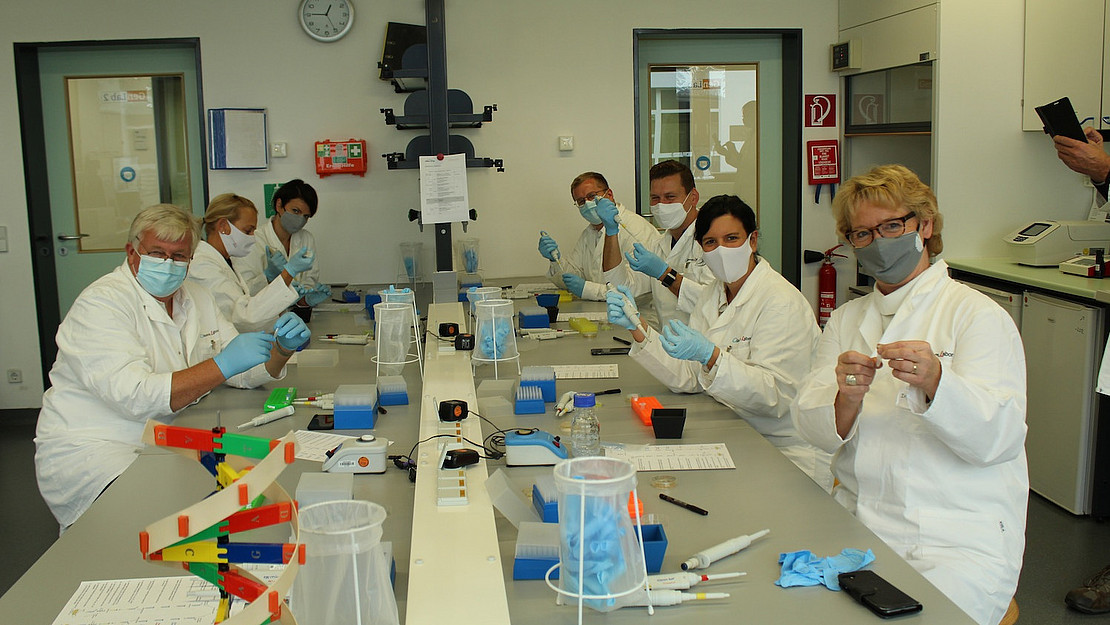This page contains automatically translated content.
Politics at the Gene Scissors - CRISPR-Cas Workshop for Members of the German Bundestag
 Image: Campus Berlin-Buch GmbH.
Image: Campus Berlin-Buch GmbH.Genome editing with CRISPR-Cas has recently been the subject of lively debate, and the award of the Nobel Prize in Chemistry to Emmanuelle Charpentier and Jennifer Doudna has once again brought it into the public spotlight. In order to form an opinion on this complex topic, it is first necessary to understand how CRISPR-Cas works and in which areas this method is or could be used.
"Politicians need not and probably cannot be experts in this field, so we are all the more pleased if they would like to obtain first-hand information and enter into a direct exchange with scientists," says course leader Dr. Heike Ziegler from Science Bridge.
To this end, Science Bridge has developed a simple experiment that illustrates how the CRISPR-Cas "gene scissors" work and facilitates the entry into a knowledge-based debate. In a half-day workshop, bacteria are "CRISPRed." In this process, a gene that colors bacteria blue is "switched off" with CRISPR-Cas so that the coloration disappears. The success of the experiment is then verified using molecular biology methods. This experiment is also offered regularly in the Glass Lab as a student course.
"Participation in this CRISPR experiment makes it possible to gain general insights into both the scientific approach and the safety requirements of a genetic engineering laboratory," says biologist and course instructor Ulrike Mittmann of the Transparent Lab.
Katrin Staffler, CDU/CSU, biochemist and member of the German Bundestag (MdB), where she serves on the Education, Research and Technology Assessment Committee, among others, suggested the CRISPR-Cas workshop for politicians: "Good political decisions need broad background knowledge. This lab day aims to provide such basic knowledge." For Kees de Vries, CDU/CSU, and a Member of the Bundestag who serves on the Committee on Food and Agriculture, gaining more detailed knowledge in the lab is also crucial: "I want to learn more about CRISPR-Cas here so that I can convince my colleagues in the Bundestag that this new technology is an asset, not a danger." Following the event, MdB Mario Brandenburg, FDP, a business information scientist and also a member of the Committee on Education, Research and Technology Assessment, said, "I feel confirmed that there are many opportunities in genetic engineering, but that society needs broader knowledge about it."
Making science transparent and understandable to the general public - and doing so on as many levels as possible - is one of the main concerns of the partnership between the Transparent Lab and Science Bridge. In addition to the workshop described above, which is also planned to take place again in Kassel in early 2021 for Hessian state and regional politicians, the teaching offer is also aimed in particular at schoolchildren and the general public.
Further information is available at https://crispr-whisper.de/
Contact:
Science Bridge e.V.
Pupil and Public Laboratory at the University of Kassel
Institute of Biology
Heinrich-Plett-Str. 40
34132 Kassel
E-mail: info[at]sciencebridge[dot]net
Tel.: 0561 804-4232
Contact:
Heike Ziegler
E-Mail: h.ziegler[at]uni-kassel[dot]de
Tel.: 0561 804-4232
Wolfgang Nellen
E-Mail: nellen[at]uni-kassel[dot]de
Tel.: 0152 32705202
Glass Laboratory
Campus Berlin-Buch
Robert-Rössle-Str. 10
13125 Berlin
Contact:
Ulrike Mittmann
E-mail: u.mittmann[at]campusberlinbuch[dot]de
Tel: 030 4892932
About Science Bridge e.V.
Science Bridge is a mobile student and public laboratory that brings current molecular biology methods and facts into schools and makes them accessible to an interested public. The association runs the DFG-funded public project CRISPR-Whisper at the University of Kassel. Science Bridge sees itself as a bridge between research and society and makes life sciences accessible to everyone. Science Bridge's main field of activity is supporting schools by offering a range of challenging molecular biology experiments, which are conducted by Science Bridge staff in middle and high school classes as part of full-day experiment days. In addition to the student courses, Science Bridge offers accredited teacher training on current molecular biology topics and teaches interested members of the public about genetic engineering at public events.
https://sciencebridge.net
About the Transparent Laboratory
The Transparent Lab is an extracurricular educational facility located on the Berlin-Buch Campus, an internationally renowned science and biotechnology park. Its five student laboratories offer over 20 experimental courses on molecular biology, cardiovascular, neurobiology, chemistry, radioactivity, and ecology for secondary school students. The course content is closely related to current research on campus, so that the latest knowledge can be imparted. With around 14,000 students and teachers taking part in courses each year, the Glass Laboratory, founded in 1999, is one of the most frequented student laboratories in the Federal Republic.
The Transparent Lab is supported by the campus partners Max Delbrück Center for Molecular Medicine in the Helmholtz Association (MDC), Leibniz Research Institute for Molecular Pharmacology (FMP), and Eckert & Ziegler AG, as well as by numerous patrons and sponsors.
www.glaesernes-labor.de